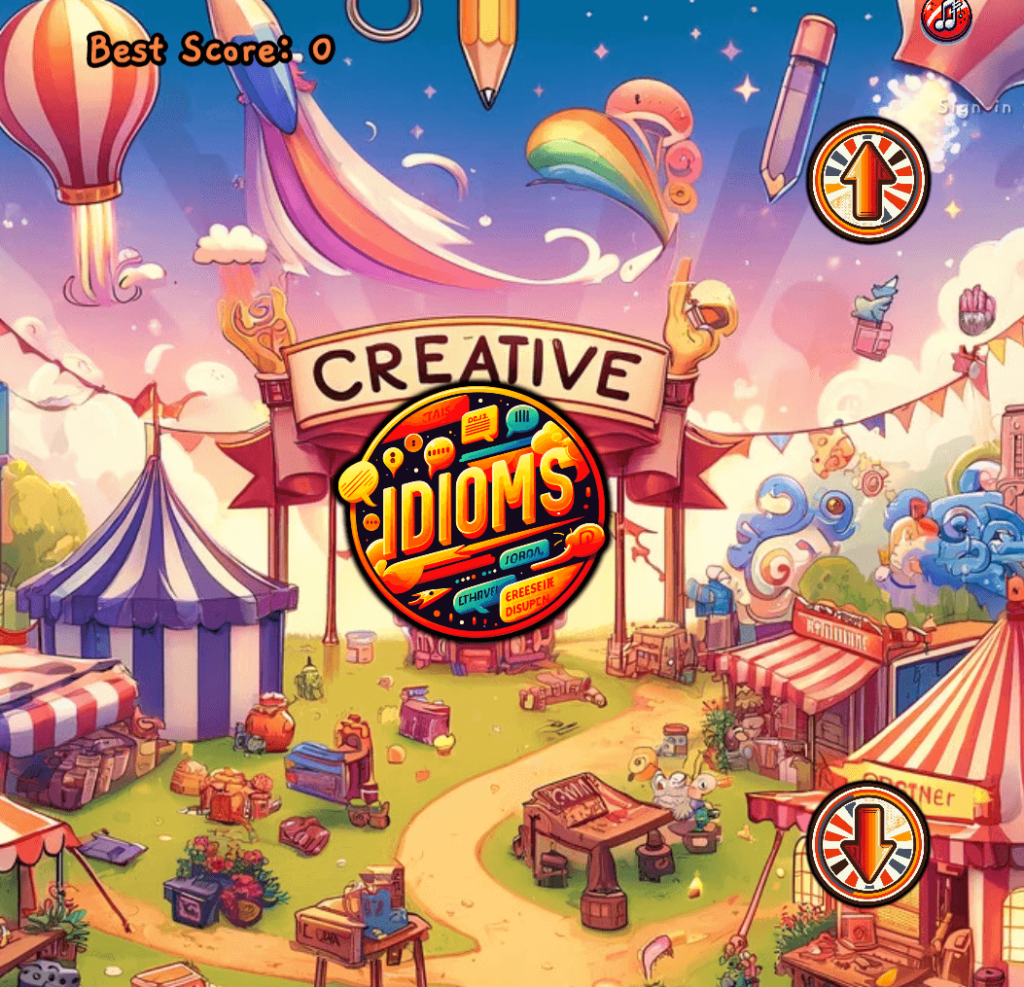Introduction
Hey there, young language explorers! Today, we’re going to learn about something super fun and interesting called idioms. An idiom is a special phrase where the words mean something different from what they usually mean. It’s like a secret code that people use to express ideas in a fun way! For example, if someone says “it’s raining cats and dogs,” it doesn’t mean animals are falling from the sky. It just means it’s raining very hard!
Reasons to Use
Idioms make our conversations colorful and fun. They help us describe things in a more exciting way and can make stories and talks more interesting. People use idioms every day to express their feelings, share experiences, and even to make jokes.
Out in the Wild!
You can use idioms when you’re talking to your friends, telling stories, or even when you’re writing something. They help you sound creative and can make people smile because they often have funny images or ideas in them.
Examples
Here are three idioms to start with, from easy to a bit more challenging:
Beginner: "Piece of Cake"
- Meaning: Something that is very easy to do.
- Example: “Cleaning my room was a piece of cake!”
Intermediate: "Hold Your Horses"
- Meaning: Wait a moment; be patient.
- Example: “Hold your horses! We will leave in five minutes.”
Expert: "Bite Off More Than You Can Chew"
- Meaning: Trying to do something that is too difficult for you.
- Example: “I bit off more than I could chew when I tried to read that big book in one day.”
Break the Ice
- Meaning: To start a conversation in a social setting.
- Example: “To break the ice, he told a funny joke.”
Hit the Hay
- Meaning: To go to bed.
- Example: “I’m really tired, so I’m going to hit the hay.”
Under the Weather
- Meaning: Feeling sick.
- Example: “She didn’t come to school today because she’s feeling under the weather.”
Piece of Cake
- Meaning: Something very easy to do.
- Example: “The math test was a piece of cake!”
Spill the Beans
- Meaning: To reveal a secret.
- Example: “He accidentally spilled the beans about the surprise party.”
A Dime a Dozen
- Meaning: Very common and not special.
- Example: “Plastic toys are a dime a dozen.”
Break a Leg
- Meaning: Good luck.
- Example: “You have a big performance tonight? Break a leg!”
Hit the Nail on the Head
- Meaning: To be exactly right.
- Example: “You hit the nail on the head with your answer!”
Cost an Arm and a Leg
- Meaning: Very expensive.
- Example: “That fancy bike costs an arm and a leg.”
Let the Cat Out of the Bag
- Meaning: To reveal a secret.
- Example: “She let the cat out of the bag about the gift.”
Hold Your Horses
- Meaning: Wait a moment; be patient.
- Example: “Hold your horses! We’ll be there soon.”
Bite Off More Than You Can Chew
- Meaning: Trying to do something that is too difficult.
- Example: “He bit off more than he could chew by signing up for five clubs.”
The Ball Is in Your Court
- Meaning: It’s your decision now.
- Example: “I’ve done all I can; the ball is in your court.”
Caught Red-Handed
- Meaning: Caught in the act of doing something wrong.
- Example: “He was caught red-handed trying to steal cookies.”
Once in a Blue Moon
- Meaning: Very rarely.
- Example: “We only see them once in a blue moon.”
Burn the Midnight Oil
- Meaning: To work late into the night.
- Example: “She had to burn the midnight oil to finish her project.”
Cry Over Spilled Milk
- Meaning: To be upset about something that can’t be fixed.
- Example: “There’s no use crying over spilled milk.”
Jump on the Bandwagon
- Meaning: To join others in doing something popular.
- Example: “Everyone’s learning to skate, so I decided to jump on the bandwagon.”
Kick the Bucket
- Meaning: To die.
- Example: “The old man in the story kicked the bucket.”
Raining Cats and Dogs
- Meaning: Raining very hard.
- Example: “Don’t forget your umbrella; it’s raining cats and dogs!”
Troubleshooting Tips
If you hear an idiom and it doesn’t make sense, don’t worry! Ask an adult or look it up in a dictionary to find out what it really means. Also, try to think about the situation where it was used – that can give you clues about its meaning.
Also known as...
Idioms can also be called expressions, phrases, or sayings.
Where else is this Used?
As you get older, you’ll find that idioms can be a part of jokes, stories, and even in movies and songs. Understanding idioms helps you understand the deeper meaning behind what people are saying, making you a super language detective!
Memory Tips
To remember idioms, try drawing a picture of what the idiom literally says and then write what it really means underneath. This makes it easier to remember because you’re using both pictures and words.
Game Time!
You can play a game of charades with idioms! Write down different idioms on pieces of paper, put them in a hat, and take turns acting them out without speaking. Your friends or family have to guess the idiom you’re acting out. It’s a fun way to learn and remember idioms together!
And there you have it – your very own guide to idioms! Now you can impress your friends and family with these fun and quirky phrases. Enjoy exploring the wonderful world of idioms!
Practice Idioms at Creative Carnival at Fynschool, there are many more examples
